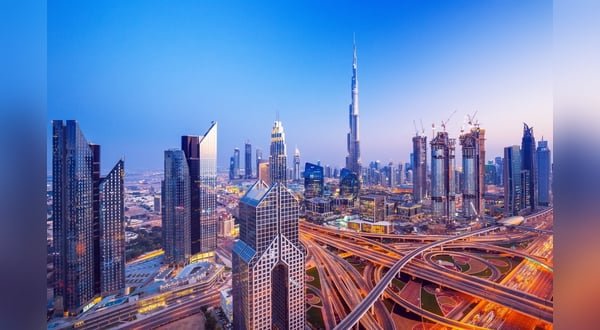The UAE’s residential real estate sector is poised for steady and sustainable expansion over the coming years with the overall market value projected to surge from $143.22 billion in 2025 to $217.09 billion by 2030, marking a CAGR of 8.66 per cent.
The growth will be supported by strong investor sentiment, proactive policy reforms, demographic shifts, and a maturing housing market that continues to attract global capital, real estate experts say.
According to market intelligence from Statista and Mordor Intelligence, residential real estate transactions in the UAE are expected to grow at a compound annual growth rate (CAGR) of 2.66 per cent between 2025 and 2029. “More optimistically, the overall market value is projected to surge from $143.22 billion in 2025 to $217.09 billion by 2030, marking a CAGR of 8.66 per cent.
These growth forecasts underscore deepening confidence in the UAE’s urban development model. Record levels of millionaire migration, liberal visa policies, and the post-Expo infrastructure boom have significantly boosted demand, particularly in Dubai, Abu Dhabi, and increasingly, Ras Al Khaimah. Developers are responding with faster off-plan project deliveries, aided by digital design tools and modular construction, even as supply remains tight relative to accelerating population growth.
Dubai continues to dominate the market, accounting for 45 per cent of residential real estate transactions in 2024, with 43,000 transactions worth Dh115 billion recorded in Q1 2025 alone — up 23 per cent year-on-year. This momentum is backed by enhancements in transport infrastructure, expansion of public green spaces, and a diversification of the service economy, transforming the emirate into a permanent lifestyle hub rather than a transient business destination.
Badar Rashid Alblooshi, chairman of Arabian Gulf Properties, said the sustained market growth is a positive indicator for the real estate sector of the UAE. “s demand matures and diversifies, developers must continue to innovate and deliver communities that serve the long-term aspirations of residents and investors alike.”
Off-plan activity is gaining traction, with primary sales forecast to grow at 10.39 per cent CAGR through 2030. Buyers are drawn to flexible payment plans, bespoke unit features, and the long-term upside of capital appreciation. In Q1 2025, off-plan deals made up 56 per cent of total residential activity. Developers are actively launching projects with a combined pipeline of over 288,000 units, while tokenized ownership models are beginning to open access to fractional investments.
In terms of property type, apartments continue to dominate with a 73 per cent market share in 2024. They offer strong rental yields — averaging 6.7 per cent — and appeal to urban professionals and investors alike. However, villas are driving the premium segment’s growth with a 9.20 per cent CAGR, as buyers shift toward more spacious, peripheral locations such as Dubai South. The Dh128 billion expansion of Al Maktoum Airport is a key catalyst here, enhancing long-term value in surrounding districts.
Luxury residential real estate is booming, driven by an influx of high net worth individuals seeking safe-haven destinations with zero income tax and political stability. The UAE recorded a net inflow of 6,700 millionaires in 2024, with Russian investors alone injecting $6.3 billion into the housing market since 2022. New premium projects, such as Nakheel’s Bay Villas, continue to sell out within days, with unit prices exceeding $4 million. The luxury segment is expected to expand at a 10 per cent CAGR through 2030, bolstered by developments on Saadiyat Island and emerging collaborations between developers and global luxury brands.
The mid-market segment remains the backbone of the market, representing 47 per cent of transaction value in 2024 and catering primarily to salaried expatriates. However, an affordability gap persists, with only one in four new units priced within reach of households earning between Dh3,000 and Dh10,000 per month. Land releases have been targeted to address this, with 17,080 affordable units slated for development, yet financing remains a challenge amid rising mortgage rates.
The cost of borrowing has increased sharply, with the 12-month Emirates Interbank Offered Rate (EIBOR) climbing to 5.306 per cent in June 2024, pushing average mortgage rates to 6.65 per cent. This has particularly impacted mid-income buyers relying on high loan-to-value structures. Cash transactions dominate the Abu Dhabi market, accounting for 70 per cent of sales and mitigating financing pressures in the luxury and upper-mid segments.
Government reforms such as the Golden Visa and Retirement Visa schemes have expanded the buyer base, streamlining residency pathways and encouraging longer stays. Golden Visa issuances jumped 52 per cent in the first half of 2024 following reduced fees and easier eligibility thresholds. This policy environment is also supporting a nascent senior housing segment and boosting transaction conversions through faster processing and legal transparency.
Ras Al Khaimah is rapidly emerging as a key growth node in the UAE’s residential landscape, thanks to major tourism projects and better connectivity. The emirate is forecast to grow at a 10.05 per cent CAGR through 2030, attracting capital that might have traditionally concentrated in Dubai or Abu Dhabi.
According to property market analysts, despite the positive outlook, some vulnerabilities persist. Volatile oil prices have led to inconsistent funding for affordable housing programs in subsidy-dependent emirates. A recent Dh2.3 billion allocation helped clear backlogs, but highlighted the dependency on federal transfers and the urgency of diversifying fiscal sources. Meanwhile, ICRA’s June 2025 data reflected a slowdown in coal output and electricity generation, which tempered construction activity and power demand.
Nonetheless, digital tenancy contracts, increasing home ownership conversions in Abu Dhabi, and the sustained pace of population and tourist growth all point to a durable, investor-friendly real estate environment, market experts added.

